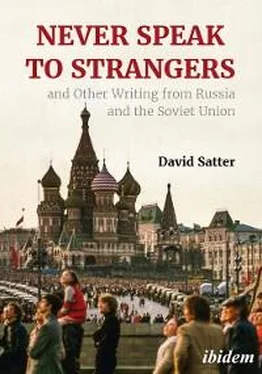A prime example of the Soviet bureaucracy’s ability to waste time is the need to write a letter for the performance of any bureaucratic task, no matter how minor. The letter must be written on office stationery, stamped with an office stamp and delivered by hand. “This is why we never write to each other,” said one woman with extensive experience in such matters. “We’re too busy writing letters to bureaucratic organizations.”
When I went for my first appointment at a Soviet government ministry, I was surprised to learn that the man I had made an appointment to see was not in his office, I wasn’t allowed past the guard downstairs.
Several phone calls during the day to the man’s office brought varying theories as to his whereabouts. When I finally contacted him at 4:30 p.m., he cheerfully told me to come back the next day. I had forgotten to write him a letter.
The need to waste time writing reams of useless letters can make life difficult, but it is not as serious as the months of seemingly endless delay before any request is filled.
The delivery of a letter to a Soviet bureaucratic organization, far from insuring that the matter will be attended to, only signals the beginning of a long process of negotiations that reaches its climax after exhausting every possibility of delay.
One of the first things I needed in Moscow was a Telex, which I requested shortly after I arrived. Initial application was made to the press department of the Ministry of Foreign Affairs. As summer turned to fall, inquiries about the Telex were answered with, “You must wait a little longer,” or “We’re thinking about it,” “Call back in two weeks,” or “it’s being considered.”
Finally, demands for action and persistent harassment of the woman responsible brought Foreign Ministry approval—and the news that I had to apply to the Ministry of Communications. There I was told that installation of the Telex presented complicated technical problems. Weeks and months elapsed while the problems were considered in all their complexities.
At last, installation was ruled technically feasible but legally not permitted because of the layout of the apartment where the Telex was to be placed. Only after several more weeks of negotiations, punctuated by angry arguments, was the Telex finally installed.
The bureaucratic immobility of Soviet organizations is a part of life in Moscow and holds true for everything, from arranging life’s necessities to getting permission to emigrate.
In my case, the requirements were routine, but hiring a secretary took three months, getting a new car has taken six months, getting hot water three months, and routine repairs for a relatively small apartment took almost three months.
The rooted inefficiency seems to reflect bureaucratic indifference, but it has an effect on ordinary workmen when they work under official auspices and at official rates of pay.
When I was allocated my apartment in a solidly built building on Moscow’s main ring road, I was told that the work would be completed in a few days. And, with six men working, it should have been.
During the weeks that followed, however, those six workmen became a familiar sight around the building, taking extended breaks, which in the Soviet Union are often longer than actual worktime, sunning themselves in the courtyard and socializing with friends.
By the time I began making daily visits to the apartment to encourage them to work faster, they had succeeded in installing a stove and sink, removing them, and installing them again. They were considering removing them a second time when I stressed my approval of the original placement and urged them to get on with the work.
Victor, himself a young Soviet bureaucrat, tried to explain the reason for the delays. “There are people who can sit in one place for eight hours, look busy and do absolutely nothing. In our country, this is an art.”
The senseless delays are exasperating but they do have a kind of justification. The Soviet bureaucracy is designed to process masses and reflects Soviet society, which guarantees employment and is organized like a giant company store in which payment is in chits, good only for purchasing the company’s products.
Pay is low in the Soviet Union, usually not much above 140 rubles a month (approximately $ 187), and the Soviet bureaucrat or workman, so indifferent to the people he’s serving, may feel his effort is not appreciated. “Why should people work hard for 100 rubles a month?” said one young secretary. “It’s barely enough to live on.” Or as one man put it, “I pretend that I’m working, and they pretend that they’re paying me.”
Soviet Citizens and longtime foreign residents avoid established bureaucratic channels and get things done through informal contacts. This is because delays and inefficiencies seem endemic to Soviet organizations and the consumer economy. Buying an item in a Russian shop, for example, can involve waiting in as many as three different lines, a line to read the prices on available items, a line to pay for them and a line to collect them.
Even in institutions where there is the potential for efficiency, one may find it difficult to operate because, to an extent that Westerners find puzzling, Russians think in terms not of facilitating action, but of preventing it.
In a society governed by an infinite number of regulations and rules, any deviation from the norm is likely to strike someone as an infraction. A perceived violation of the rules, in turn, is a welcome excuse for doing nothing.
No Appointments, No Service
When the office car broke down, I had it towed to a garage. When I arrived, the garage supervisor asked me if I had made an appointment. When I said I hadn’t, he said it would be impossible to service the car. After several hours of discussion interrupted by a lengthy lunch break, he relented and directed me to a slow-moving queue to fill out the relevant forms and drive the barely functioning car back into the garage.
There, the garage superintendent said he couldn’t service the car because I had brought it into the garage after 3 p.m. When I tried to drive the car back out of the garage area, a woman gatekeeper in her ’60s refused to let me leave with the car because I had no certificate showing I had paid to have it serviced.
Despite the Soviet penchant for over-administration and various inefficient Russian habits, the country has made progress. In recent years, there is more in the shops and the bureaucracy is somewhat less complicated. The Soviet Union, however, is still a long way from being a consumer society.
The confrontations between bourgeois foreigners and the functionaries of the first workers’ state, accordingly, take on an almost symbolic significance. Foreigners complain bitterly about the slow pace at which everything in Moscow moves, and Soviet employees blithely ignore them, secure in the knowledge that whatever anyone says about their efficiency, they are citizens of the first country in the world to have eliminated unemployment.
Chicago Daily News, Sunday, February 5–6, 1977
Angry Russians Can’t Understand Inflation
Russians are reacting with black anger and streams of curses to the news that major price increases go into effect April 1.
Unlike Americans, who accept inflation as only a little less inevitable than death and taxes, Russians are told continually that Soviet society eliminates such capitalist evils as rising prices and unemployment.
So when it was announced last month that cab fares would go up 100 per cent, air fares would increase by approximately 20 per cent and sea and river transport and made-to-measure suits would also be more expensive, the reaction of many Russians was that they were being unfairly squeezed.
Читать дальше












